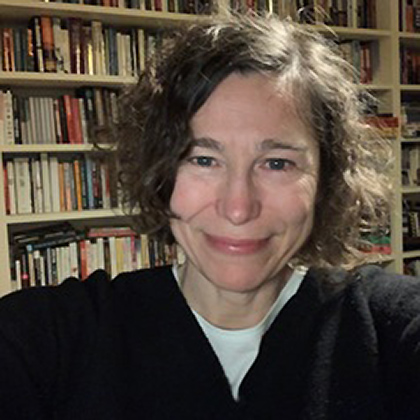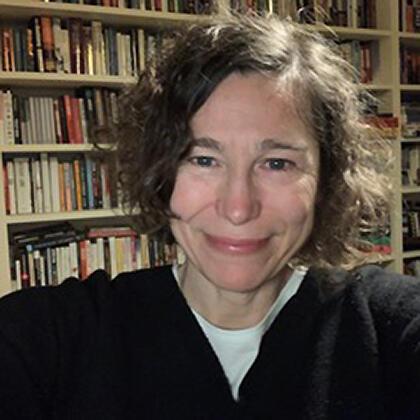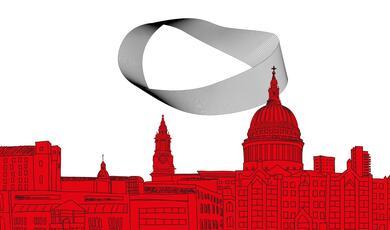Banned Books and Freedom of Expression
Share
- Details
- Text
- Audio
- Downloads
- Extra Reading
The right to free expression is severely threatened in many places in the world, yet it has also never been so passionately defended.
This lecture focuses on the recent history of banned literature. It considers the changing nature of literary censorship, arguments in defence of free expression, why literary writers have so frequently pushed the boundaries of the acceptable, and the impact of technology on censorship and free speech.
Download Text
Banned Books and Freedom of Expression
Professor Rachel Potter
12th March 2025
Why is Freedom of Expression important?
Free speech is rarely out of the headlines at the moment. It has become prominent in political, journalistic and online discussions. But in a situation where the US vice-president can accuse European countries of jettisoning free speech, what does the phrase really mean? Has it become so politicised, over-used or loose that it has ceased to have any specific meaning? And if so, is that a problem?
Freedom of expression is a privileged right in many international and national constitutions, declarations and traditions, in legal systems and in liberal political philosophy. In these contexts it has never meant the freedom to say or express whatever one likes. The meaning of free speech or freedom of expression has always involved decisions about its boundaries; about what qualifies as speech or expression, what qualifies as free speech or expression, and at what point the freedom to express should be prohibited because of its potential harms – whether to other people, national security, government authority, rights to privacy, or social cohesion.
While the balance between the freedom to express and harm is different in different democracies, differences that are dependent on specific historical legacies and the societal norms they shape, when the claim is made that someone has a right to free speech it tends to mean that a person has a moral right that ought to be recognised and enforced by the law. It does not necessarily mean that a person has the moral right and, should be protected, to falsely cause panic and mayhem through speech simply for his or her own selfish reasons or to gratuitously abuse or de-humanise someone else.
Sometimes, when free speech is invoked politically or in the culture wars its privileged status as a moral or political value is referenced and mined, while it is used to signify in ways that are contrary to the tradition or arguments that underpin its privileged status.
My answer to my own opening question, then, is – yes - I think that it is a problem when free expression becomes overused and politicised. I want to suggest that the right to free expression is an important right, and that in order to defend it we need a more circumscribed and robust idea of why it is important and what its limits are. In my talk I will examine the history of banned literary books in the UK and suggest that this history has some important things to tell us about why that is.
A short history of banned books in the UK
Why has freedom of expression enjoyed a privileged status in democratic systems? I will summarise some of the key broad claims that have been made – mostly about political speech.
I will then ask what are the more specific issues involved in defending the free expression of literary texts – the banned books of my title?
I am going to examine the following:
- The writer in prison. As we sit here today there are many people around the world who are in prison because of what they have written. The writer in prison symbolizes, in a very direct way, why the freedom to express is important.
- The scale of literary books that were banned when they were first published, or subsequently.
- The relationship between banned literary books and literary value. Many literary works that were prohibited when they were first published are now part of the literary canon. They are the books that are taught in schools and universities. What does this tell us about banning books and literary value?
- What is the relationship between authoritarian governments and the banning of books? What can the authoritarian leader possibly have to fear about a poem or a novel? I will discuss the famous story about Stalin’s response to a 1933 poem by Osip Mandelstam and suggest how the story reveals important issues about why literature is seen as powerful and important.
- Historically, why have books been banned in democratic systems? Focus on the UK and the
following books that were banned, taken to court or have been significantly targeted:
- James Joyce’s Ulysses. The publishers of the US journal The Little Review , which published episodes of Ulysses, were taken to court and judged guilty of publishing an obscene work in New York in 1921. They were fined and prohibited from publishing further episodes. After the book was published as a whole in Paris in 1922, its distribution was then prevented in the UK through the Customs Consolidation Act.
- Radclyffe Hall’s The Well of Loneliness was taken to court and banned as an obscene libel in London in 1928. This is a novel about the development of a lesbian woman from birth to adulthood. It contains no explicit reference to sexual activity.
- Penguin Books were taken to court for publishing a paperback edition of D. H. Lawrence’s Lady Chatterley’s Lover in 1960. The trial took place after the passing of the new Obscene Publications Act of 1959. It was effectively a test case for the new law. The publishers were acquitted and it was a watershed moment in British cultural history, as well as setting down some precedents for subsequent legal trials of literary works.
- In 1966 the publishers Boyars and Calder were taken to court for publishing Hubert Selby’s Last Exit to Brooklyn and found guilty by an all-male jury of publishing an obscene book. The case was sent to appeal in 1968 and the Appeal Court overturned the decision.
The key ways in which literary expression was defended in these cases
The arguments used to defend the books listed above included the following:
- We would want to have a good reason to limit what someone else can write or read, but one reason is that the expression can instigate harm. But it is almost impossible to prove that a literary text has instigated harm because of the features of fictional or poetic works. They tend to be linguistically playful, open-ended and multivocal. In the cases of Ulysses, The Well of Loneliness, Lady Chatterley’s Lover and Last Exit to Brooklyn the prosecution argued that these books produced moral corruption, and that particular members of the public were susceptible to this moral corruption – specifically women readers, particularly young women readers. The defence of literary works involved shifting the focus from corruption to harm, and insisting that for a work to be deemed obscene it was necessary to prove that it produced real-world physical harms.
- In the cases of Ulysses, The Well of Loneliness and Lady Chatterley’s Lover, the prosecution selected parts of these books and argued that they were obscene. The defence insisted that the books needed to be judged as a whole, but this was only relevant legally after the passing of the 1959 Obscene Publications Act which ruled that a work had to be judged as a whole. Any kind of argument about the aesthetic value of a literary text – why we would teach such books in universities – would treat them as a whole. Literary works are also often seen as autonomous – ie they are important because of their literariness not because of their capacity to represent other forms of knowledge – politics or law, for instance. Aesthetic examinations of autonomous literary works connect to arguments about self-realisation important in philosophical defences of free expression.
- Literary works are sincere or ‘serious’. They are not written with the aim of being gratuitously offensive. In the cases of Ulysses, The Well of Loneliness, Lady Chatterley’s Lover and Last Exit to Brooklyn the defence insisted that the authors had written them with sincerity and seriousness. They were, then, within their own terms, truthful and sincere.
- In the interests of democratic equality it is inadmissible to argue that some people – for instance young women – are particularly susceptible to moral corruption or harm and that books need to be banned because of this. In all of the cases above the idea that women readers were susceptible was significant.
Conclusion
The right to freedom of expression loosens when the phrase is taken to mean that all speech is protected, irrespective of whether it qualifies as free speech or expression, and whether it should be prohibited because of its potential harms. It also loosens or diminishes when people successfully claim the right to decide for others what they can and cannot read. This is not an issue consigned to the history books. In the US, a battle over book bans in schools is taking place as we speak. Among the works being targeted are The Handmaid’s Tale by Margaret Atwood, The Kite Runner by Khaled Hosseini, The Bluest Eye by Toni Morrison, and The Color Purple by Alice Walker. Some of the arguments used to target these books are ones that are familiar to us from the history I have sketched.
In this talk I have suggested that the right to free expression is important, and that in order to defend it we need to be clear about what it is we are defending and why it is important. And I have suggested that the history of banned books in the UK has revealed some important issues about why that is.
© Professor Rachel Potter, 2025
References and Further Reading
Alexander, Larry. Is There A Right to Freedom of Expression? 2005.
Appignanesi, Lisa. Ed. Free Expression is No Offence. 2005.
Avalle, Ginevra, and Jennifer Clement, Peter McDonald, Rachel Potter, Carles Torner, Laetitia Zecchini. PEN International: An Illustrated History. 2021.
Barendt, Eric. Freedom of Speech. 2007.
Coetzee, J. M. Giving Offense: Essays on Censorship. 1996.
Collini, Stefan. That’s Offensive! Criticism, Identity, Respect. 2010.
Darnton, Robert. Censors at Work: How States Shaped Literature. 2014.
Dwarkin, Ronald. Taking Rights Seriously. 1997.
Garton Ash, Timothy. Free Speech: Ten Principles for a Connected World. 2016.
Hall, Radclyffe. The Well of Loneliness. 1982.
Haworth, Alan. Free Speech: All That Matters. 1998.
Fish, Stanley. There’s No such thing as Free Speech and it’s a good thing, too. 1994.
Lawrence, D. H. Lady Chatterley’s Lover. 1961.
Matsuda, Mari J., and Charles R. Lawrence, Richard Delgado, Kimberlè Crenshaw. Words that Wound: Critical Race Theory, Assaultive Speech, and the First Amendment. 1993.
Meiklejohn, Alexander. Free Speech and Its Relation to Self-Government. 1948.
Mill, John Stuart. On Liberty and other writings. 1991.
Milton, John. Areopagitica and other political writings. 1999.
Nossel, Suzanne. Dare to Speak: Defending Free Speech for All. 2020.
Petley, Julian. Censoring the Word: Manifestos for the 21st Century. 2007.
Potter, Rachel. Obscene Modernism: Literary Censorship and Experiment 1900-1940. 2013
Rolph, C. H., ed. The Trial of Lady Chatterley: Regina V. Penguin Books Limited. 1990.
Selby, Hubert. Last Exit to Brooklyn. 2011.
Schauer, Frederick. Free Speech: A Philosophical Enquiry. 1982.
Strossen, Nadine. HATE: Why We Should Resist It with Free Speech, Not censorship. 2018.
Titley, Gavan. Is Free Speech Racist? 2020.
Vanderham, Paul. James Joyce and Censorship: The Trials of ‘Ulysses’. 1998.
Warburton, Nigel. Free Speech: A Very Short Introduction. 2009.
Williams, Bernard. Obscenity and Film Censorship: An Abridgement of the Williams Report. 1981.
© Professor Rachel Potter, 2025
References and Further Reading
Alexander, Larry. Is There A Right to Freedom of Expression? 2005.
Appignanesi, Lisa. Ed. Free Expression is No Offence. 2005.
Avalle, Ginevra, and Jennifer Clement, Peter McDonald, Rachel Potter, Carles Torner, Laetitia Zecchini. PEN International: An Illustrated History. 2021.
Barendt, Eric. Freedom of Speech. 2007.
Coetzee, J. M. Giving Offense: Essays on Censorship. 1996.
Collini, Stefan. That’s Offensive! Criticism, Identity, Respect. 2010.
Darnton, Robert. Censors at Work: How States Shaped Literature. 2014.
Dwarkin, Ronald. Taking Rights Seriously. 1997.
Garton Ash, Timothy. Free Speech: Ten Principles for a Connected World. 2016.
Hall, Radclyffe. The Well of Loneliness. 1982.
Haworth, Alan. Free Speech: All That Matters. 1998.
Fish, Stanley. There’s No such thing as Free Speech and it’s a good thing, too. 1994.
Lawrence, D. H. Lady Chatterley’s Lover. 1961.
Matsuda, Mari J., and Charles R. Lawrence, Richard Delgado, Kimberlè Crenshaw. Words that Wound: Critical Race Theory, Assaultive Speech, and the First Amendment. 1993.
Meiklejohn, Alexander. Free Speech and Its Relation to Self-Government. 1948.
Mill, John Stuart. On Liberty and other writings. 1991.
Milton, John. Areopagitica and other political writings. 1999.
Nossel, Suzanne. Dare to Speak: Defending Free Speech for All. 2020.
Petley, Julian. Censoring the Word: Manifestos for the 21st Century. 2007.
Potter, Rachel. Obscene Modernism: Literary Censorship and Experiment 1900-1940. 2013
Rolph, C. H., ed. The Trial of Lady Chatterley: Regina V. Penguin Books Limited. 1990.
Selby, Hubert. Last Exit to Brooklyn. 2011.
Schauer, Frederick. Free Speech: A Philosophical Enquiry. 1982.
Strossen, Nadine. HATE: Why We Should Resist It with Free Speech, Not censorship. 2018.
Titley, Gavan. Is Free Speech Racist? 2020.
Vanderham, Paul. James Joyce and Censorship: The Trials of ‘Ulysses’. 1998.
Warburton, Nigel. Free Speech: A Very Short Introduction. 2009.
Williams, Bernard. Obscenity and Film Censorship: An Abridgement of the Williams Report. 1981.
Part of:
This event was on Wed, 12 Mar 2025
Support Gresham
Gresham College has offered an outstanding education to the public free of charge for over 400 years. Today, Gresham College plays an important role in fostering a love of learning and a greater understanding of ourselves and the world around us. Your donation will help to widen our reach and to broaden our audience, allowing more people to benefit from a high-quality education from some of the brightest minds.


 Login
Login







